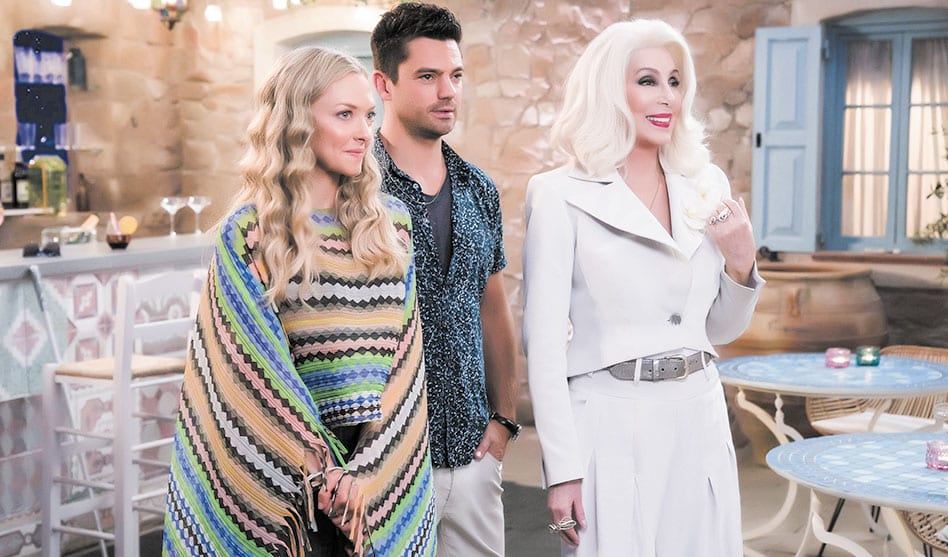Sophie’s (Amande Seyfried) grandmother (Cher) shows up at the end of ‘Mamma Mia,’ but that’s not a spoiler —
the film is too sweetly predictable to deny you her appearance.
How do you make a sequel to a film that shot its wad the first time? With Cher, dammit!
ARNOLD WAYNE JONES | Executive Editor
jones@dallasvoice.com
The 2008 movie version of Mamma Mia! was, until Wonder Woman, worldwide the highest-grossing live action film ever directed by a woman, so making a sequel of any monster hit would seem to be a no-brainer.
Except how do you make a sequel to a musical whose entire raison d’etre was a showcase for the hit songs of the disco-era supergroup ABBA? Once you exhaust their catalogue of hits — 15 impressively catchy, Zeitgeisty dance club classics dot the original, with a half-dozen less memorable songs filling out the set-list and cobbled into the rough outline of a plot — what’s left to get your toes tapping to? Sure, Mamma Mia! notably omitted “Fernando” and “Waterloo;” that’s two you can work with.
But that’s not a feature film; it’s barely a short.
But no studio ever let an impossible task stand in the way of its quest for a box office bonanza. It fell to Ol Parker — a British screenwriter (The Best Exotic Marigold Hotel) whose sole directorial effort to be released this side of the pond was 2005’s lesbian romance Imagine Me & You — was saddled with the responsibility.
And boy did he make it work.
Mamma Mia! Here We Go Again won’t make many (any?) year-end-best lists, and while it does utilize “Fernando” and “Waterloo,” it pads the soundtrack with a slate of songs that would feel shoehorned into the plot if only they were worth listening to in the first place. (He also sneaks in “reprises” of “I Have a Dream,” “Dancing Queen” and “Super Trouper” to flesh out the storyline.) But all that seems incidental to the squishy, happy mood the film leaves you with.
One risky decision is that while virtually the entire original cast returns, only Amanda Seyfried as Sophie could be considered to have a major role in this one. It’s been a year since Sophie’s mom Donna (Meryl Streep) has died, and she’s reopening the Grecian hotel with a huge party. That puts her in a sentimental mood, as we flashback to how Donna (played as a young woman by Lily James) ended up on this Mediterranean island in the first place: Meeting the string of men who could be Sophie’s father and putting down roots here.
To be honest, it doesn’t make a lot of sense. But let’s face it — the very nature of most musicals is confectionery; style and tone and attitude predominate over character development and (usually) plot. Musicals trade in familiar tropes and then explore them by having people break out into song and dance to embody their emotions. And that’s just what it delivers.
There’s a surprising sophistication to Parker’s visual design; lots of cross-cutting and matching shots that draw people and places separated by time and space together.
And he builds to the big reveal: The first appearance in feature film since 2010’s Burlesque by the iconic Cher as Sophie’s grandmother.
Is it a gimmick, a stunt to get the gays into the theater? You betcha. (She’s only in the last 20 minutes, and speaks, by my count, 16 lines of dialogue in addition to two songs.) But it’s a thrill nonetheless when she croons out “Fernando” as a surprising, kitchy duet with Andy Garcia. It’s the cherry on this fluffy meringue.
Still, it’s mostly James who carries the picture, which she does brightly with a lovely singing voice and open, golden aura. Seyfried — the only really good singer in the original — also lends her vocals to several songs. They more than make up for the occasionally croaking by Pierce Brosnan, Stellan Skarsaard and a few others.
After the revolutionary development of the movie musical with La La Land and The Greatest Showman, Mamma Mia! Here We Go Again does feel a bit quaint. But that’s also something most musicals embrace. Be the first in line and take a chance on it.
Now playing in wide release.












